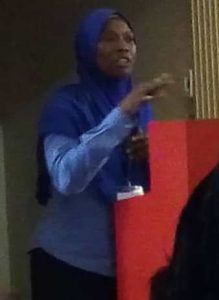Her colleagues call her the “Warrior Researcher” behind her back. Why they do so is not that clear. But anyone who listens to her addressing an audience might put it to the distinctiveness of Dr Afusat Jagun Jubril’s voice, how piecing it rises and the authoritative manner she communicates generally. She leaves a listener with thinking if any students of hers can complain of not getting any point in the class because she appears to be a very good example of the belief that the teacher makes all or most of the difference in learning.
But Dr. Afusat, the University of Ibadan, (UI) lecturer in Veterinary Medicine is a peculiar kind of warrior. For some reasons that are also not that clear, it is not her forte to easily grant an interview. Intervention managed to sit down with the researcher in clinical pathology, environmental toxicology and climate change (in which she is also an activist) although the interruptions were such that it was a short encounter.
The product of Usman Dan Fodio for her First Degree, of the University of Ibadan for her Masters and the PhD and postdoctoral exposure in a Kenyan university can be said to be an embodiment of the academic as a globalist.

On the podium at a recent academic event where she shone brilliantly
You come off very clear, categorical and authoritative. The voice can be called that of a natural teacher. Is that natural to you or you are a product of grooming?
I think most of that is innate and self-confidence that came with my upbringing. There is also the element of extra coaching. The University of Ibadan has a training programme for fresh academics covering teaching, supervising and mentoring which I benefited from. I have also gone for other international programmes
So, you are substantially a product of grooming, from your verbal facility, the declaratory turn where necessary and so on?
It is partly natural or inherited and partly learnt. Both parents were teachers. And I went to a Nigeria based British primary school in Sokoto where teaching was not just instruction but constructive instruction almost like the Montessori thing in practice these days. But I have also enjoyed other avenues to grooming, especially the BootCamp Workshop for early-career African innovators and scientists by Grand Challenge Africa through the African Academy of Science.
Is the exposure there that transformative, including those observable benchmarks?
Yes, it gives you benchmarks and enriches your skills in those abilities as speaking to the point
To what extent does your experience support or refute the strong view that the quality of teacher determines learning?
That must be obviously so. A look at four stages of self-directed learning model also highlights how the role of teachers and students working together is important for effective learning.
How did you arrive at Veterinary Medicine as a course? One would have thought you are a material for the humanities
By choice or should I say by selection? I say so because even when I got in and found it to be a very tough area, I had to roll up the sleeves to face the challenges head-on rather than run away. To be honest, I’m confident I would have been okay in any field.
What happened next?
I had a waiting period before youth service, tried my hands on private practice and ambulatory services with a few established senior colleagues. Then I eventually had my youth service in a state ministry of agriculture before I finally told myself it was time or final decision. After much consultation, I found myself in the Master’s program for a further degree in Veterinary Pathology and I have never looked back. I am now into lecturing and research and that means local and international involvements.
Do you sometimes secretly wish you should have studied something else?
No. If I come again, which I don’t believe in, I would still study Vet Medicine, Vet Pathology, in particular. It complements my person. And whether by choice, selection or divine intervention, I found myself in a great disciple and specialty.
Almost everyone is complaining about crisis of standard in the university. What is your take on how we might get it back?
I would think it has to be from where we lost it and that’s at the roots. The quality at the university level is related to the quality below. Until there is a change in educational standard at the grassroots from primary to the secondary level, there is very little change that will be seen at the university level.
A Vice-Chancellor recently argued that the way out is guaranteeing the quality of lecturers by making the doctoral programme in Nigeria tougher.

Are they starting education with being caned, cramming states and capital or learning with joy?
How many lecturers had PhD before they started lecturing? Learning is not a one-way process, it depends not just on the lecturers but also on the students. The basic education, drive and motivation of the students also count. Education must be such that takes children as pupils and adults as students, with standard and uniform structures in place. That is, for example, to play where they will run out their energy, sing and dance, while learning in style with joy, and not to memorize states and capital as they are doing all over Nigeria now. The problem with the quality crisis is a multifaceted problem. One of them is the basic background of the average student. Was learning introduced to him or her with cane or cramming or by understanding? The way education or learning was first communicated to a child can define everything else. If the child was introduced into it as knowledge being about a way of life and something enjoyable, the child will go along. That is why I said the issue is at the roots, not at the university level. Then add the ability to include local content in our education. I say this because most of the subjects and courses we studied with great pain are eventually not useful. The PhD program cannot be any tougher judging by the standard I know, practice and advocate (unless you want to increase the number of patients in the mental health clinics), but it will help for such trainings to be demand driven, solving societal problems and with local content. By such methods, a teacher or lecturer will have a sense of purpose and be more articulate in sharing such.
It means you do not think that quality lecturers can change things because there is the argument that anyone who is properly educated can successfully impart knowledge
No, I do not agree. Teaching is a skill that has to be learnt and mastered. I am not saying there are no natural instincts associated with it or that an informed lecturer can be an asset. I am saying it also requires certain skills to teach.
There are many students in secondary schools who are very brilliant, in spoken English, in writing and everything else. However, the moment they enter the university, trouble begins.
A lot of factors are playing out. They are being distracted. They are being exposed to life for the first time alone. They need someone who can help play the role of managing life outside home with great understanding. Many of the undergraduates today are like they have, all of a sudden, been released from the cage of parental or headmaster/principal’s control. Many of them are knowing how to do things by themselves for the first time, complicated by peer pressure. Everything has been done for them by mummy, daddy, uncles, house helps and driver. So, entering the university is like dropping into an ocean without anyone paddling. Disarray and confusion sets in.
So, you think a personal touch to university administration in terms of guiding them would help?
It would help. We are doing that here in UI – student manager – mentoring programme. I guess it is university wide but we do it in my department/faculty. That is where students are attached to particular lecturers for care and mentoring. I have a few and three in the present 100 level class. It has improved the quality of our students. They respond better, are much calmer. It is not like dropping into an ocean without anyone paddling for most of them any longer. I also enjoy the relationship I have with them and how I have seen them transform positively, although it requires extra effort to achieve.
So, who do we say Afusat is?
An Ilorin or a Kwara woman married to an Ondo man
General laughter!
In Nigeria, determining your state of origin will be problematic
General laughter!
I can claim both
More laughter!




























